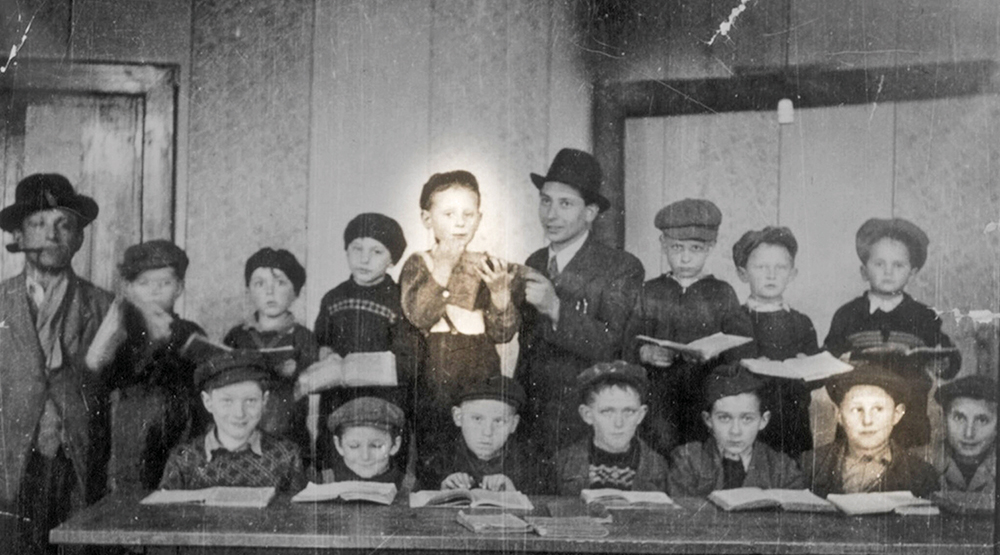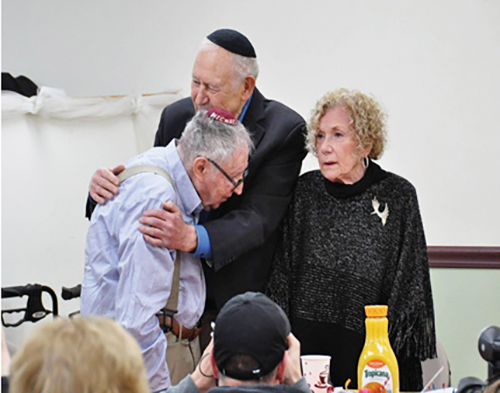
They say a picture is worth a thousand words, but for two elderly Holocaust survivors it spanned a lifetime of memories.
Thet survivors were in the same class at a displaced persons camp as children following the war and would later immigrate to the United States, attend the same college and even work at the same company as engineers, yet never reunited until a school project accidentally brought them together.
Michael Epstein of Fair Lawn and Abe Rosenberg of Queens were both students in a cheder class at the Feldafing Displaced Persons Camp in Germany. However, it wasn’t until both participated in the Names, Not Numbers project that they laid eyes on each for the first time in 76 years.
As part of the intergenerational endeavor students receive assistance from professionals in conducting interviews and creating documentaries featuring survivors. More than 7,000 students in several countries have interviewed, filmed and edited the testimonies of over 4,000 survivors and World War II veterans. The program was created by Jewish educator Tova Fish-Rosenberg in 2003 to build a bond between survivors and students and give a human dimension to the horrors of the Shoah.
Epstein was participating in the Rabbi Pesach Raymon Yeshiva in Edison where his great-niece, Tahlia Avery, was part of last year’s project. He brought a photo of his childhood class to the filmmaking. The videographer recognized the photo as one brought by another survivor at a Names, Not Numbers program months before in New York. The photo is also part of the collection at the U.S. Holocaust Memorial Museum.
And so decades later, Epstein, 87, and Rosenberg, 82, embraced at a reunion at the Young Israel of New Hyde Park, attended by Rosenberg’s older sister, Ada Gracin, who was also in the DP camp.
“I just called him up and said, ‘This is Michael Epstein from Feldafing,’” recalled the octogenarian, noting that a small reunion was planned but Rosenberg’s synagogue organized a celebratory brunch attended by about 100 people.
“It was great to hug each other,” said Epstein.

Rosenberg called the meeting “very special,” adding, “We are not the same age. He is older than me but he actually knew my sister. They were friends so the whole meeting was quite extraordinary. One of the first things we did was make a bracha, the Shehecheyanu, and then we hugged each other. It was almost like a dream.”
Epstein’s family was from Lodz, Poland, where his mother was a seamstress and his father a butcher. As the Germans moved in, his extended family “split into pieces” with some staying and some leaving. None survived the Holocaust. Epstein’s father had joined the Polish Army and arranged to meet the rest of the family in Bialystok, which fell under control of the Russians, who transported Jews to a forced-labor camp in Siberia. Conditions were brutal.
“I remember my mother chopping down trees in Siberia,” said Epstein, for the wood-burning stove. “We didn’t have much to eat. Food was very scarce and most of us were starving. There were no medical facilities and people were dying rather rapidly.”
The family was later sent to Uzbekistan. After the war, they returned to Lodz to find their apartment occupied and an unwelcome atmosphere. With nowhere to go, the family made its way to Feldafing, which had been used as a Hitler youth training camp.
They were Zionists and had hoped to go to Palestine, but when offered an opportunity to come to the United States, the family took it, settling in the Bronx. Epstein would later attend the City University of New York (CUNY) and then the Massachusetts Institute of Technology and become an aerospace engineer at Bendix Corp. in Teterboro, which contracted with NASA. Epstein worked on the space shuttle program.
Like Epstein, Rosenberg’s parents were natives of Lodz. His mother was pregnant with him when they fled to Georgia, where he was born and where they lived in constant fear. After the war, they too returned to Lodz to find their home was taken over and no survivors.
“We were not welcomed and there was quite a nasty atmosphere,” said Rosenberg. “It was quite dangerous, and the Poles were conducting pogroms against Jews who returned.”
The family connected with Brihah, an organization smuggling survivors from Eastern Europe and Allied-occupied zones into pre-state Israel. He said that as they made their way through such places as Poland and Czechoslovakia they were warned not to speak Hebrew or Yiddish. Unfortunately, Brihah was unsuccessful in its efforts and the family found itself in the American-occupied zone in Germany where they were taken to the DP camp, staying from 1945 to 1949 until coming to the U.S. despite discriminatory immigration quotas.
“The law was so fashioned so as not to favor Jewish refugees,” said Rosenberg. “They were concerned Jews were communists and dangerous to America.”
Fortunately, his father had an uncle in New York, who sent an affidavit agreeing to sponsor the family so “they would not be a burden to America.”
The Rosenbergs settled in Brooklyn and Abe eventually went to CUNY and became an electrical engineer, who while at Bendix worked on the supersonic transport and Concorde programs.
“Michael was working in the space program and our paths never crossed,” he noted.
The two have remained in touch since the extraordinary meeting. Epstein, who said he has “a bunch of grandchildren and great-grandchildren” said he now spends his time reading books, doing jigsaw puzzles and studying Torah through synagogues he belongs to in Fair Lawn, Paramus, Mount Freedom and Florida. The rabbi from one of those, Benjamin Yudin of Congregation Shomrei Torah in Fair Lawn, came to the reunion in New Hyde Park.
Rosenberg, who proudly said has a son and daughter—one a doctor and the other a financial reporter—still finds it hard to believe the “unique experience” from a long-ago past really happened. “It was a miraculous situation,” he said.
Names, Not Numbers has made a short documentary about the meeting available on YouTube, at https://www.youtube.com/watch?v=n2tNBTPqU5w.












